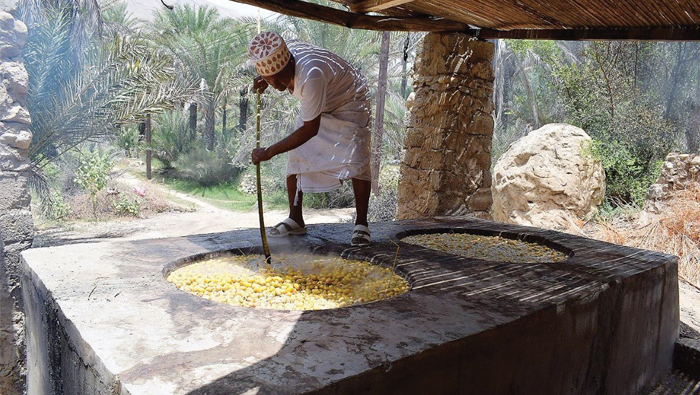
Muscat: Many of the Sultanate’s governorates are witnessing the harvesting season, locally known as Al Tabseel, of ‘Al Mabsali’ and other varieties of palm dates.
The social and economic phenomenon, rich in traditions and customs, has been preserved by Omanis with their care and interest in the date palm tree.
Al Tabseel of palm dates is associated with one kind of palm date called ‘Al Mabsali’. ‘Al Mabsali’ is cooked before it ripens when it is yellow in colour, and is called ‘Busoor’.
The Ministry of Commerce and Industry has affirmed the continuation of its approach and role in receiving ‘Busoor’ every year in the Ministry’s warehouses in Al Wadi Al Kabir from the various governorates of the Sultanate producing Omani ‘Busoor’.
It also provides support to farmers supplying their crops. It also releases subsidies for farmers who export their Busoor production for 2019 for foreign markets directly to encourage them to find alternative and new markets to export Busoor.
The Ministry will offer bids for the sale of this year’s crop to give local companies the opportunity to buy the crop and market it locally and abroad. The Ministry has made some amendments to the handling tender, Busoor processing and sale bid this year in order to reduce loss, compared to previous years.
It is hoped that date of receiving Busoor at the warehouses will be during the period from 9/12/2019 to 7/2/2020.
The Ministry completed on 7/2/2019 the receipt of the last year’s crop of the three types (Al Mabsali, Al Madlouki and Abu Naranja). A total of 544 suppliers delivered 2,475,331 tonnes of dates valued at OMR878,450. Farmers directly exported 311,300 tonnes of dates worth OMR19,456. The Ministry has called upon farmers to pay attention to the quality of the product they supply or directly export to foreign markets and ensure that it is clean and well purified of impurities to maintain its reputation and compete in the local and foreign markets.